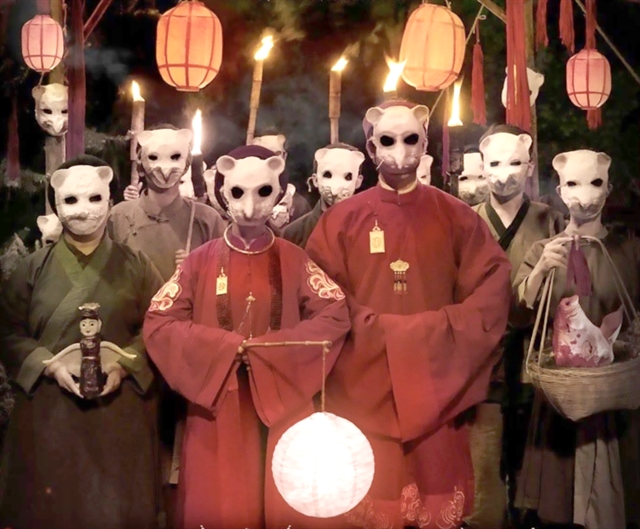 Life & Style
Life & Style

 |
| Kicker: A scene in "Kẻ ăn hồn" (A soul reaper) movie. Photo thanhnien.vn |
HCM CITY - Two Vietnamese horror films, "Kẻ ăn hồn" (A soul reaper) and "Quỷ cẩu" (Demon Dog), are currently showing in theaters with impressive box office revenue, attracting a large audience and making the Vietnamese movie industry more lively.
In the past, Vietnamese horror films were often criticised for lacking creativity, relying solely on elements such as ghosts, demons, spells and murderers.
However, currently, many filmmakers are focusing more on developing plots, characters, and settings, infused with the rich cultural colors of Việt Nam. They use folklore materials, drawing inspiration from supernatural folk stories or urban legends with spiritual elements.
This approach has given Vietnamese horror films a distinct identity, making them more relatable to the audience and avoiding the tendency to imitate foreign films, as before.
Speaking about incorporating folklore into films, director Trần Hữu Tấn stated that his previous horror films like "Bắc Kim Thang" (Home Sweet Home) and "Chuyện ma gần nhà" (Vietnamese Horror Story) deliberately chose indigenous aspects and cultural elements because, "Vietnamese folklore has a treasure trove of stories imbued with spiritual and supernatural colors that stimulate the creativity of filmmakers."
Recently, Tết ở làng địa ngục" (Tết in hell village) has been dominating the top spot on K+ and Netflix, surpassing many popular international films for several consecutive weeks.
With the success of the series "Tết ở làng địa ngục" and the theatrical film "Kẻ ăn hồn", the producer-director duo Hoàng Quân and Tấn have achieved a remarkable turnaround, opening a new and hopeful direction for the horror genre, especially those with purely Vietnamese elements, in the near future.
Tấn shared, "Revenue of over VNĐ60 billion (US$2.4 million) for “Kẻ ăn hồn” and the audience's love for “Tết ở làng địa ngục” are quite positive results from our process of learning from our previous film projects."
Indeed, when watching "Tết ở làng địa ngục" or "Kẻ ăn hồn," one can notice that excessive jump scares and the portrayal of ghostly figures have been reduced.
Most characters in the film, from humans to spiritual forces, are meticulously handcrafted, providing the audience with a genuinely frightening experience.
The biggest strength of these two films lies in their portrayal of settings, costumes and props, using materials deeply rooted in Vietnamese culture.
Meanwhile, the debut film "Quỷ cẩu" by the young director Lưu Thành Luân draws inspiration from the supernatural folk story of the "chó đội nón mê" (the hat-wearing dog), a legend that tells of dogs possessed by spirits rising on their hind legs and instigating demons to disturb people in their homes until their bodies become malicious spirits.
The film's story is simple but focuses on the spiritual and psychological aspects of a family involved in the long-standing dog meat trade, depicting how dogs are killed, creating haunting and chilling scenes.
The film's strength lies in its interpretation of the intricate plot, logical development of events, and the integration of the spiritual element from folklore, conveying it fully with weighty images.
"Quỷ cẩu" has already earned nearly VNĐ20 billion (US$819,924) after its early screenings, making it a late-year surprise for Vietnamese cinema, despite criticism for its CGI effects due to budget constraints when the dog transforms into a demon.
Great potential
According to the owner of Mega GS Cinema, Bích Liên, the appeal of horror films in Vietnamese theaters is real and explains why Thailand, South Korea, Japan always focus on producing many films of this genre, and Vietnamese distributors purchase many of them to screen.
“Even our Mega GS Entertainment company has produced horror films for Tết in 2022 and 2023, such as “Nhà không bán” (The house is not for sale) and “Vong nhi” (The fetus), and achieved high profits,” she said.
The horror film genre, when done right, will be a lucrative area to develop in the Vietnamese cinema market, she added.
With its unique local cultural colors adapted to international trends and audience tastes, Vietnamese horror films will have many opportunities to be bought by many countries for screening, thereby increasing profits and promoting Vietnamese culture and cinema, experts said.
"With film censorship now more open and less restrictive than before, the Vietnamese horror film genre only faces one big challenge, which is to enhance the quality of films in every aspect, making more effort to earn the trust of the audience," director Victor Vũ said, stating that he plans to embark on a new thriller-horror project in April next year. - VNS




